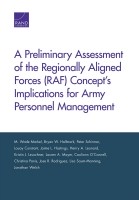| 来源类型 | Research Reports
|
| 规范类型 | 报告
|
| ISBN | 9780833090645
|
| 来源ID | RR-1065-A
|
| A Preliminary Assessment of the Regionally Aligned Forces (RAF) Concept's Implications for Army Personnel Management |
| M. Wade Markel; Bryan W. Hallmark; Peter Schirmer; Louay Constant; Jaime L. Hastings; Henry A. Leonard; Kristin J. Leuschner; Lauren A. Mayer; Caolionn O'Connell; Christina Panis; et al.
|
| 发表日期 | 2015
|
| 出版年 | 2015
|
| 页码 | 110
|
| 语种 | 英语
|
| 结论 |
The Army Has Relatively Little Empirical Information About the Personnel Implications of Regionally Aligned Forces (RAF)- At this point, there has been almost no opportunity to compare different approaches to manning the force in support of RAF and determine that one alternative is superior to others.
Potential Demand for Regional Expertise Appears Likely to Be Moderate- Demand for regional expertise currently appears to be concentrated at the operational level, at the division echelon and higher, and in theater-level enablers, particularly intelligence, logistics, and signal units.
- The eventual requirement might not exceed 4,300 soldiers.
Acquiring Regional Expertise Need Not Conflict with Traditional Career Development Patterns- Acquiring appropriate regional expertise need not conflict with normal career progression, at least not substantially.
The Army Will Probably Produce Enough Soldiers with Relevant Expertise to Meet This Modest Demand- After several years of RAF implementation, the Army will likely accrue sufficient inventories of personnel with the required degree of regional experience. The Army should be able to fill positions with regionally experienced personnel and still retain a modicum of selectivity.
Current Personnel Management Practices and Recordkeeping Systems Do Not Enable the Army to Match Supply with Demand- A sufficient number of soldiers will probably have the needed expertise, but it is very hard to match the supply with the demand given the level of information currently in Army personnel data.
- For the most part, data about soldiers' regionally relevant experience, education, and training are available neither to assignment personnel nor to units in the field.
|
| 摘要 |
- Enable a regional qualification system to evolve. Army personnel managers should analyze assignment decisions made in this context over time in order to determine which positions benefit from regional expertise and which do not.
- Leverage the Army's adoption of talent management to support Regionally Aligned Forces (RAF). Leveraging talent management would enable the Army to learn from experience which billets require what degree of regional expertise, rather than trying to guess correctly in advance.
- Make soldiers' RAF-relevant education and experience available to personnel managers. Personnel development skill identifiers (PDSIs) provide a ready-made vehicle for doing so. Although a soldier can acquire many PDSIs over the course of a career, the Army could prioritize RAF-relevant PDSIs for inclusion in this field on the Soldier Record Brief.
|
| 主题 | Enlisted Personnel
; Military Command and Control
; Military Officers
; Military Personnel Retention
; United States Army
|
| URL | https://www.rand.org/pubs/research_reports/RR1065.html
|
| 来源智库 | RAND Corporation (United States)
|
| 资源类型 | 智库出版物
|
| 条目标识符 | http://119.78.100.153/handle/2XGU8XDN/108030
|
推荐引用方式
GB/T 7714 |
M. Wade Markel,Bryan W. Hallmark,Peter Schirmer,et al. A Preliminary Assessment of the Regionally Aligned Forces (RAF) Concept's Implications for Army Personnel Management. 2015.
|
|
文件名:
|
x1495316257540.jpg
|
|
格式:
|
JPEG
|

|
文件名:
|
RAND_RR1065.pdf
|
|
格式:
|
Adobe PDF
|
除非特别说明,本系统中所有内容都受版权保护,并保留所有权利。